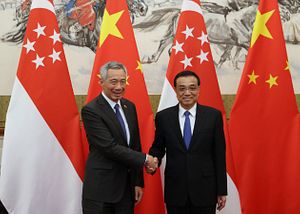During the Boao Forum in Hainan, China, all eyes were on Chinese President Xi Jinping’s speech. Other countries both within Asia (including China’s neighbors in South and Southeast Asia) and elsewhere (especially Western countries like the United States) were closely observing Xi’s speech to get an idea into his views on important geopolitical and economic issues: globalization, great power relations, and the Belt and Road Initiative.
While Xi got most of the spotlight, remarks made by Singaporean Prime Minister Lee Hsien Loong during the course of a media interview, as well as at the Boao Forum itself, were also important. Singapore is not only the ASEAN chair for 2018, but shares close relations with China and the United States.
In an interview to the state-run People’s Daily newspaper, Lee spoke in favor of the Belt and Road Initiative: “The [BRI] will benefit many countries that need more and better infrastructure. It is also compatible with keeping the regional architecture and international system open and inclusive.”
During the course of the interview, Lee also emphatically stated that Singapore will favor Chinese participation in the “regional architecture” as well as the “international system.”
While speaking at the Boao Forum, meanwhile, he said that the United States and China needed to resolve the current differences over trade, given the importance of the relationship. Dubbing the U.S.-China relationship the “most important bilateral relationship in the world,” the Singaporean prime minister said that “if the disputes escalate and destabilize U.S.-China relations, the consequences for the world could be catastrophic.”
Lee also urged China to contribute more to multilateralism.
China would have paid close attention to Lee’s remarks, since Beijing has looked up to Singapore as a model, especially in the context of its efficient governance and successful running of state-owned enterprises. The architect of China’s reforms and modernization, Deng Xiaoping, repeated on more than one occasion that China could learn a lot from Singapore’s experience. A number of Chinese officials from state-owned enterprises go every year to study public policy in Singapore.
Singapore, through its visionary leadership, deft diplomacy, and commendable economic achievements, has been successful in punching above it weight within the Indo-Pacific region. As a beneficiary of globalization, it would want great powers like the United States and China to iron out their differences, and not adopt inward-looking policies. This was evident from Lee’s speech at the Boao Forum.
Given its relevance in Asia, Singapore is likely to play an important role not just in the context of geopolitical issues, but also issues like the Regional Comprehensive Economic Partnership, a major multilateral trade deal currently stuck in negotiations. In doing so, Singapore must strike a delicate balance between major partners like the United States, China, and India. Thus it will be interesting to see if Singapore, which has been urging China to bolster multilateralism and integrate more with the international system, also plays any role in advising China to genuinely address apprehensions over the Belt and Road Initiative.
It remains to be seen as well how seriously Beijing takes the Singaporean prime minister’s advice with regard to being more open in every sense and proactively participating in the international system.
Tridivesh Singh Maini is a New Delhi-based policy analyst associated with the Jindal School of International Affairs, OP Jindal Global University, Sonipat.

































